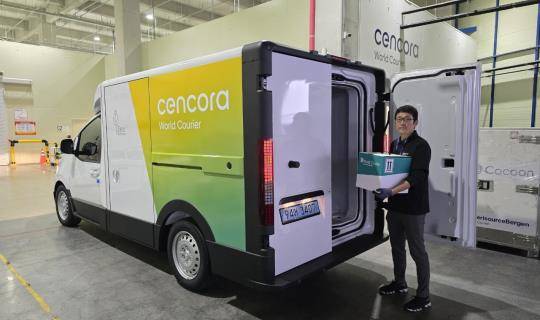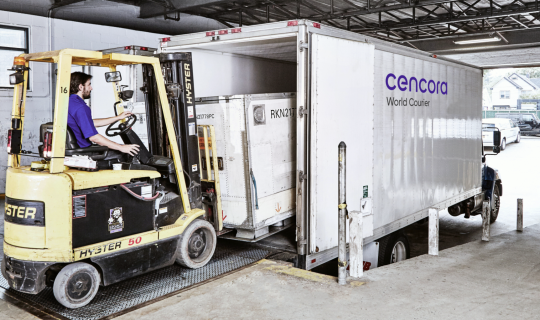The power of collaboration: How trusted logistics partners can help you fill the distribution gap
By Mads Skovvang, Adam Tamanini
Transitioning from small-scale clinical trial distribution to a large-scale commercial launch is a critical and complex phase for smaller organizations like biotech startups or independent manufacturers.


Scaling up to meet commercial demand — navigating regulatory compliance, managing temperature-sensitive shipping, and ensuring global distribution — requires expertise across all stages of the pharmaceutical journey, from molecule to market. This includes handling active pharmaceutical ingredients (APIs), intermediates, and finished dosage forms with precision. Without dedicated logistics managers or supply chain teams, the process can feel overwhelming. Delays at this stage can lead to significant costs, including loss of sales, missed first-to-market opportunities, competitive disadvantages, and the risk of evolving regulations eating into valuable patent time.
But you don’t have to face these challenges alone. By collaborating with trusted distribution experts, you can fill critical gaps, build resilient supply chains, and focus on what you do best – bringing life-changing products to patients.
One of the most pressing challenges you might face is the lack of dedicated logistics expertise. Without this, inefficiencies, compliance risks, and difficulties in scaling operations can quickly arise. For example, transporting therapies like biologics or gene therapies requires precise temperature control and specialized equipment – something many smaller organizations aren’t equipped to manage on their own.
This is where collaboration makes all the difference. Working with logistics experts who understand these demands ensures your products are handled with care. With robust quality management systems and real-time monitoring, you can mitigate risks and ensure your shipments arrive safely and on time.
“Smaller organizations often don’t have the infrastructure to manage the complexities of pharmaceutical logistics, but that’s where collaboration comes in,” says Mads Skovvang, Europe Product Manager, Commercial Supply Chain at World Courier. “A trusted logistics partner will act as an extension of your team, bringing the expertise and tools you need to overcome these challenges.”
Staying compliant with international regulations, such as good distribution practice (GDP) and Food and Drug Administration (FDA) standards, can feel like a full-time job. Regulations are constantly evolving, and it’s not just about knowing what they are today but also anticipating what’s coming next. Each country has its own rules and navigating them without expert support is both time-consuming and stressful. The stakes are high — non-compliance can halt shipments, disrupt timelines, and damage trust with patients and partners. Keeping up with these changes requires embedded expertise — you don’t know what you don’t know.
Partnering with a logistics provider with global GDP certification ensures consistent compliance across regions, giving you the peace of mind that your products will reach their destination without delays. With local quality managers on the ground in over 50 countries, trusted experts can also help you navigate regulatory challenges more efficiently.
As you move from clinical trials to commercialization, your supply chain needs become significantly more complex. Transitioning from supplying a limited number of sites on a regular schedule, as dictated by the study protocol, to meeting the fluctuating demands of a global market requires more than just operational adjustments — it’s a fundamental shift in thinking. Managing this transition demands proactive planning to scale logistics effectively, yet it’s easy to focus on R&D and leave logistics as an afterthought. Without the right strategies in place, you risk delays, inefficiencies, and missed opportunities in a highly competitive landscape.
Engaging a logistics partner early — during Phase II or early Phase III clinical trials — allows you to build scalable supply chains that are ready to meet the demands of commercialization. From securing storage solutions to planning for global distribution, early collaboration reduces risks and ensures a seamless transition.
“Proactive planning is key to avoiding last-minute challenges,” says Mads. “A trusted distribution expert will work with you early to anticipate your needs and create strategies that scale with you as you grow.”
If budget constraints are holding you back, it’s important to think about the long-term costs of doing nothing. Building in-house logistics capabilities or investing in advanced technologies can feel expensive, but the alternative — product losses, shipment delays, and compliance failures — can cost you far more in the long run.
By collaborating with a trusted logistics partner, you gain access to the expertise, infrastructure, and technology you need — without the overheads of building it yourself.
With tools like real-time location monitoring, electronic quality management systems (eQMS), and reusable packaging solutions, you can further reduce costs while improving reliability. Real-time monitoring allows you to track shipments throughout their journey, enabling proactive responses to potential disruptions and minimizing delays. Electronic quality management systems streamline compliance processes, reducing administrative burdens and ensuring adherence to evolving regulatory standards with greater efficiency. Meanwhile, reusable packaging solutions not only lower packaging costs but also support sustainability goals by reducing waste. Together, these tools enhance operational efficiency, improve product safety, and provide greater peace of mind throughout the supply chain.
“Small pharma and biotech companies need to consider logistics service providers (LSPs) with vast industry knowledge and experience to navigate the complexities of global transportation and ever-changing regulations. Delays and setbacks occur in clinical trials when the solution cost is more important than the solution result,” says Adam Tamanini – Sr. Manager, Products Services North America.
Managing last-mile delivery — the final step in a product’s journey — can be one of the most challenging aspects of pharmaceutical logistics. For complex therapies that require precise handling, such as cell and gene therapies, ensuring secure delivery to patients or healthcare facilities is critical.
A logistics partner with advanced real-time monitoring technologies gives you full visibility into your shipments. This enables quick responses to potential disruptions and ensures your products remain within range throughout their journey, leaving patient safety intact.
But you don’t have to face these challenges alone. By collaborating with trusted distribution experts, you can fill critical gaps, build resilient supply chains, and focus on what you do best – bringing life-changing products to patients.
Overcoming logistics gaps
One of the most pressing challenges you might face is the lack of dedicated logistics expertise. Without this, inefficiencies, compliance risks, and difficulties in scaling operations can quickly arise. For example, transporting therapies like biologics or gene therapies requires precise temperature control and specialized equipment – something many smaller organizations aren’t equipped to manage on their own.
This is where collaboration makes all the difference. Working with logistics experts who understand these demands ensures your products are handled with care. With robust quality management systems and real-time monitoring, you can mitigate risks and ensure your shipments arrive safely and on time.
“Smaller organizations often don’t have the infrastructure to manage the complexities of pharmaceutical logistics, but that’s where collaboration comes in,” says Mads Skovvang, Europe Product Manager, Commercial Supply Chain at World Courier. “A trusted logistics partner will act as an extension of your team, bringing the expertise and tools you need to overcome these challenges.”
Navigating compliance with confidence
Staying compliant with international regulations, such as good distribution practice (GDP) and Food and Drug Administration (FDA) standards, can feel like a full-time job. Regulations are constantly evolving, and it’s not just about knowing what they are today but also anticipating what’s coming next. Each country has its own rules and navigating them without expert support is both time-consuming and stressful. The stakes are high — non-compliance can halt shipments, disrupt timelines, and damage trust with patients and partners. Keeping up with these changes requires embedded expertise — you don’t know what you don’t know.
Partnering with a logistics provider with global GDP certification ensures consistent compliance across regions, giving you the peace of mind that your products will reach their destination without delays. With local quality managers on the ground in over 50 countries, trusted experts can also help you navigate regulatory challenges more efficiently.
Scaling supply chains for commercialization
As you move from clinical trials to commercialization, your supply chain needs become significantly more complex. Transitioning from supplying a limited number of sites on a regular schedule, as dictated by the study protocol, to meeting the fluctuating demands of a global market requires more than just operational adjustments — it’s a fundamental shift in thinking. Managing this transition demands proactive planning to scale logistics effectively, yet it’s easy to focus on R&D and leave logistics as an afterthought. Without the right strategies in place, you risk delays, inefficiencies, and missed opportunities in a highly competitive landscape.
Engaging a logistics partner early — during Phase II or early Phase III clinical trials — allows you to build scalable supply chains that are ready to meet the demands of commercialization. From securing storage solutions to planning for global distribution, early collaboration reduces risks and ensures a seamless transition.
“Proactive planning is key to avoiding last-minute challenges,” says Mads. “A trusted distribution expert will work with you early to anticipate your needs and create strategies that scale with you as you grow.”
The cost of doing nothing
If budget constraints are holding you back, it’s important to think about the long-term costs of doing nothing. Building in-house logistics capabilities or investing in advanced technologies can feel expensive, but the alternative — product losses, shipment delays, and compliance failures — can cost you far more in the long run.
By collaborating with a trusted logistics partner, you gain access to the expertise, infrastructure, and technology you need — without the overheads of building it yourself.
With tools like real-time location monitoring, electronic quality management systems (eQMS), and reusable packaging solutions, you can further reduce costs while improving reliability. Real-time monitoring allows you to track shipments throughout their journey, enabling proactive responses to potential disruptions and minimizing delays. Electronic quality management systems streamline compliance processes, reducing administrative burdens and ensuring adherence to evolving regulatory standards with greater efficiency. Meanwhile, reusable packaging solutions not only lower packaging costs but also support sustainability goals by reducing waste. Together, these tools enhance operational efficiency, improve product safety, and provide greater peace of mind throughout the supply chain.
“Small pharma and biotech companies need to consider logistics service providers (LSPs) with vast industry knowledge and experience to navigate the complexities of global transportation and ever-changing regulations. Delays and setbacks occur in clinical trials when the solution cost is more important than the solution result,” says Adam Tamanini – Sr. Manager, Products Services North America.
Reaching the last mile
Managing last-mile delivery — the final step in a product’s journey — can be one of the most challenging aspects of pharmaceutical logistics. For complex therapies that require precise handling, such as cell and gene therapies, ensuring secure delivery to patients or healthcare facilities is critical.
A logistics partner with advanced real-time monitoring technologies gives you full visibility into your shipments. This enables quick responses to potential disruptions and ensures your products remain within range throughout their journey, leaving patient safety intact.

Planning for the future
Collaboration doesn’t just solve immediate problems — it also prepares you for long-term success. Trusted logistics providers are constantly investing in new technologies and processes to enhance efficiency, reliability, and sustainability. For example, digital twin technology creates virtual models of supply chain operations, allowing you to simulate scenarios, optimize packaging placement, and improve depot management. This reduces inefficiencies, minimizes risks, and ensures smoother operations. Additionally, reusable packaging solutions not only streamline workflows but also reduce environmental impact by cutting down on waste. Together, these innovations help you future-proof your logistics while supporting both operational and sustainability goals.
Adam says: “Our cold chain infrastructure backed by industry-leading quality management systems , shows what’s possible when you partner with supply chain experts. Our ability to scale operations, maintain compliance, and ensure product integrity gives our customers the confidence to focus on what matters most: innovation.
“Collaboration is about more than logistics — it’s about creating a partnership that enables growth, builds resilience, and ultimately improves patient outcomes.”
Your trusted partner in logistics
The journey from clinical trials to commercialization is full of challenges, but you don’t have to face them alone. By working with trusted logistics experts, you can fill critical gaps, build resilient supply chains, and navigate the complexities of the pharmaceutical industry with confidence.
“What makes World Courier truly unique is the strength we bring as part of Cencora,” says Mads. “Our clients don’t just gain access to global distribution capabilities — they benefit from an umbrella service that covers everything from consultancy to last-mile delivery. Whether it’s market access, compliance, or operational support, we collaborate to ensure every step of the process is seamless.”
At World Courier, we’re here to help. With decades of experience, a global network, and a commitment to innovation, we provide the expertise, infrastructure, and support you need to deliver your products to market – safely, efficiently, and sustainably.
* World Courier’s performance rate of 99.6% was calculated as the number of external CAPAs, excluding CAPAs caused by shipper/consignee or force majeure, per payload shipment in 2023.
Topics:
Commercial supply chain







